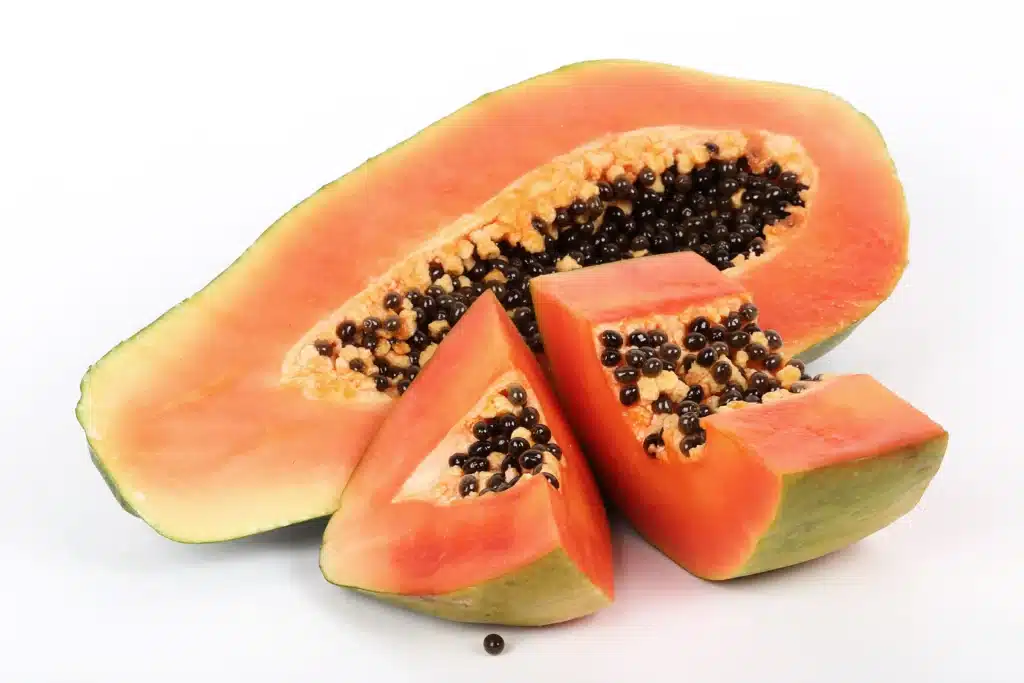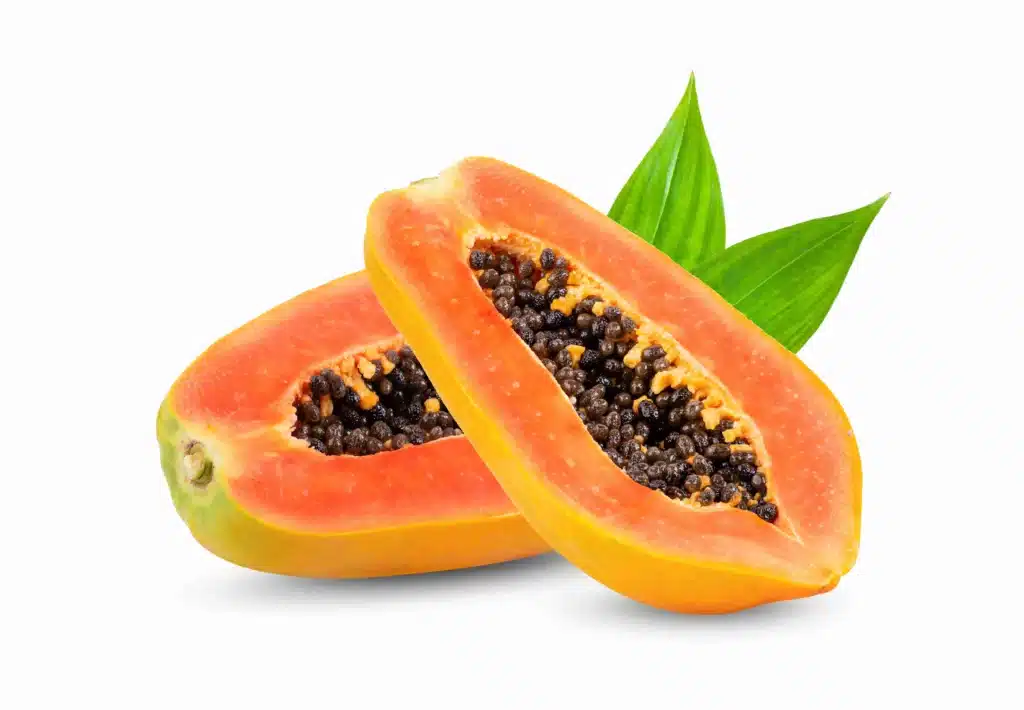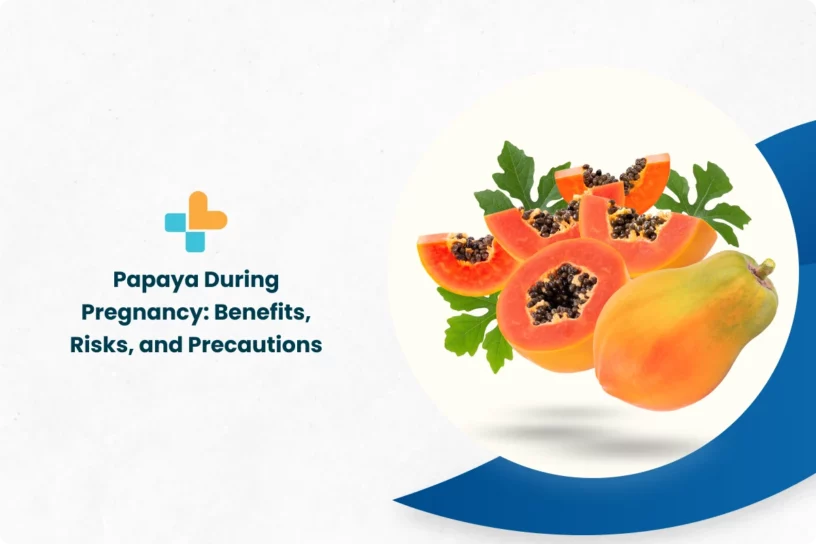Pregnancy is a critical phase in a woman’s life, and it’s essential to maintain a healthy diet to ensure the well-being of the mother and the baby. While there are various fruits and vegetables to choose from, papaya is a popular choice among many women. However, there have been debates on whether papaya is safe during pregnancy or not.
In this blog post, we’ll explore the benefits and risks of consuming papaya during pregnancy, as well as the precautions to take.

Is it Safe to Eat Papaya in Pregnancy?
Papaya is a nutritious fruit loaded with vitamins, minerals, and antioxidants, making it an excellent addition to any healthy diet. However, pregnant women should be cautious when consuming papaya as it contains an enzyme called papain that may induce contractions and lead to miscarriage or preterm labor.
Unripe or semi-ripe papaya has a higher concentration of papain and should be avoided during pregnancy. On the other hand, fully ripe papaya is considered safe in moderation, as it has a lower concentration of papain.
It’s always advisable to consult a healthcare provider before consuming papaya or any other fruit during pregnancy.
Benefits of Eating Papaya During Pregnancy
Certainly, here are some benefits of eating papaya during pregnancy in points:
- Rich in nutrients: Papaya is loaded with essential nutrients like vitamin C, folate, fiber, and potassium which are vital for a healthy pregnancy.
- Boosts Immunity: The high concentration of vitamin C in papaya helps to boost the immune system, protecting the mother and the baby from infections and illnesses.
- Aids digestion: Pregnancy can cause digestive issues like constipation, bloating, and heartburn. Papaya’s enzymes help to break down proteins, making it easier for the body to digest food.
- Reduces inflammation: Papaya contains anti-inflammatory compounds that help to reduce swelling and inflammation in the body, providing relief from joint pain and other pregnancy-related discomforts.
- Promotes fetal development: The high folate content in papaya promotes the healthy development of the fetus’s brain and spinal cord, reducing the risk of birth defects.
- Regulates blood pressure: Papaya’s high potassium content helps to regulate blood pressure levels, reducing the risk of hypertension during pregnancy.
It’s important to keep in mind that while papaya has many benefits, it should still be consumed in moderation during pregnancy, taking the necessary precautions to ensure a healthy pregnancy.

Side-effects of Eating Papaya In Pregnancy
As during pregnancy, we need to be very careful, here are some points that explain the side-effects of eating papaya in pregnancy
1) Causes Abnormal or Unnatural Uterine Contractions:
During pregnancy, the uterus undergoes several changes as it prepares for labor and delivery. However, some foods and supplements can trigger abnormal or unnatural uterine contractions that can lead to complications like premature labor or miscarriage. Papaya contains an enzyme called papain that can stimulate contractions in the uterus, potentially leading to premature labor or miscarriage. Unripe or semi-ripe papaya, which has a higher concentration of papain, should be avoided during pregnancy.
Fully ripe papaya, on the other hand, has a lower concentration of papain and is considered safe in moderation during pregnancy. However, it’s always advisable to consult with a healthcare provider before adding papaya or any other food to your diet during pregnancy.
2) Hinders or Slows Down Fetal Development:
Eating too much papaya during pregnancy can hinder fetal development due to papain, an enzyme that can cause contractions and lead to premature labor. Pregnant women should limit papaya intake, avoid unripe or semi-ripe papayas, and consult with their healthcare provider.
3) Poses a Threat to the Vital Membrane of the Fetus:
Consuming papaya during pregnancy can pose a threat to the vital membrane of the fetus, as papain in papaya can lead to the rupture of the amniotic sac, which can cause the loss of amniotic fluid and jeopardize the health of the fetus. Therefore, pregnant women should be cautious while consuming papaya and avoid unripe or semi-ripe papayas.
4) May Cause Haemorrhage and Oedema:
Consuming papaya during pregnancy can increase the risk of haemorrhage and oedema, particularly in the later stages of pregnancy. Papain in papaya can cause blood vessels to dilate and affect the body’s ability to control bleeding, leading to haemorrhage or excessive bleeding during delivery. Moreover, papaya can cause water retention, leading to swelling or oedema.
Therefore, it is recommended that pregnant women limit their intake of papaya, especially in the later stages of pregnancy, and consult with a healthcare provider if experiencing any symptoms of haemorrhage or oedema.
5) Accelerates Bowel Movement:
Papaya contains a high amount of fiber and papain, an enzyme that aids digestion and accelerates bowel movement. While this can be beneficial for constipation, it can also cause diarrhea, stomach cramps, and dehydration, particularly if consumed in excessive amounts during pregnancy.
6) Causes Kidney Stones And Raises Intra-Abdominal Pressure:
Consuming excessive amounts of papaya during pregnancy can lead to the formation of kidney stones due to the presence of oxalates in papaya. Oxalates can bind with calcium and form crystals, which can accumulate in the kidneys and cause kidney stones. Additionally, consuming large quantities of papaya can increase intra-abdominal pressure, which can cause discomfort and may lead to complications such as hernias or premature contractions.
Pregnant women should consume papaya in moderation and consult a healthcare provider if experiencing any discomfort or symptoms of kidney stones or intra-abdominal pressure.
7) Stimulates Oestrogen Production:
Papaya contains phytoestrogens, which are plant compounds that can mimic the effects of estrogen in the body. Consuming papaya during pregnancy may stimulate oestrogen production and lead to hormonal imbalances, which can cause complications such as preterm labor, low birth weight, or developmental abnormalities in the fetus.
Why are Unripe Papayas not Good for Pregnant Women?
Unripe papayas are not good for pregnant women as they contain high levels of papain, a proteolytic enzyme that can cause uterine contractions and lead to premature labor or miscarriage. Unripe papayas also have a higher concentration of latex, which can cause allergic reactions and digestive issues in some individuals.
How many papayas Should A Pregnant Woman Eat?
During pregnancy, it is safe to consume a bowl of fully ripe papaya. However, if you experience any digestive issues such as indigestion, constipation, or vomiting, it is advisable to stop consuming papaya immediately and consult a healthcare provider or a gynecologist.
Precautions to Take While Eating Papaya During Pregnancy
Here are some precautions to take while consuming papaya during pregnancy:
- Consume fully ripe papayas and avoid unripe or semi-ripe ones.
- Limit the intake of papaya to one cup per day.
- Consult with a healthcare provider before consuming papaya during pregnancy.
- If experiencing any discomfort or allergic reactions after consuming papaya, stop consuming it and seek medical advice.
- Avoid consuming excessive amounts of papaya, which can cause digestive issues and dehydration.
- Wash the papaya thoroughly before consumption to remove any contaminants or bacteria.

Final Say
In conclusion, papaya can be a healthy addition to a pregnant woman’s diet, but it is important to consume it in moderation and take necessary precautions. Fully ripe papayas are safe to consume, but unripe or semi-ripe papayas should be avoided. Pregnant women should limit their intake to one cup per day and consult with a healthcare provider, such as Ayu Health, before consuming papaya during pregnancy.
If any discomfort or allergic reactions are experienced after consuming papaya, it is advisable to stop consuming it and seek medical advice. With these precautions in mind, papaya can provide essential nutrients such as vitamin C and fiber, which can support a healthy pregnancy.
Our Hospital Locations
Gynaecology Surgery Hospitals in Chandigarh | Gynaecology Surgery Hospitals in Bangalore | Gynaecology Surgery Hospitals in Jaipur | Gynaecology Surgery Hospitals in NCR | Gynaecology Surgery Hospitals in Hyderabad
Our Doctors
Gynaecology Surgery Doctors in Chandigarh | Gynaecology Surgery Doctors in Bangalore | Gynaecology Surgery Doctors in Jaipur | Gynaecology Surgery Doctors in NCR | Gynaecology Surgery Doctors in Hyderabad
About the Author





